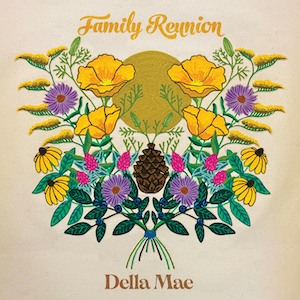
Della Mae – Family Reunion
Independent – 17 September 2021
Family Reunion is a swift follow-up to Della Mae‘s Headlight album from last year.
The album was recorded with all members in the same studio featuring singer and prime songwriter Celia Woodsmith, award-winning fiddler Kimber Ludiker, bassist Vickie Vaughn, Avril Smith on electric guitar and mandolinist Maddie Witler.
Written partly in response to the pandemic, the Nashville-based all-female bluegrass quintet deliver a compelling, aptly titled set, tracing themes of both loss and hope.
It opens with the most obvious pandemic-related track, the mid-tempo mandolin chug These Songs, addressing, as have many artists, the impact of events on working musicians as Woodsmith sings about missing life on the road (“I miss long lines at the airport waiting at a bus station for transport to carry me to my destination…this lifestyle’s a part of me”), wondering “how long will there be no one to sing these songs”.
Led off by Witler, they follow with the first of three covers, a frisky old-time run through John Hartford’s You Don’t Have To Do That, which, introduced by Woodsmith, offers each member a chance to showcase their instrumental chops after each refrain. The two other non-original songs are weighted towards the latter half of the album, next up being a twangy romp through Welch and Rawlings’ wryly amusing Dry Town that seems guaranteed to have the reassembled crowds singing along on the chorus and sees Vaughn and Smith on harmonies, the latter laying down some fine guitar licks. The third, closing the album, is pure old school honky tong country with fiddle anchoring the waltztime sway as Woodsmith warbles through Hazel Dickens’ A Few Old Memories.
Returning to their own material, Ride Away, loosely inspired by Richard Thompson’s 1952 Vincent Black Lightning but also surely Leader Of The Pack and other 60s motorbike death ballads as, backed by flying fiddle, Woodsmith sings about a guy following his late daddy’s words about running from love, so you don’t get hurt but then, remembering that momma said that “true love was not to waste”, turning his thunderbird back around only to skid on the gravel and, well you know how it goes.
Two types of loss are captured on the old-time slow waltzing Goodbye My Friend/Waltz for Lois; the vocal part, written by Woodsmith, is about regretting a long friendship coming to a bitter end (“We had a good run in the end/I still sing all the songs/We sang together for so long …pride won’t let us make amends but I still dream of you as a child… I’ll hold on to the memories that don’t bring me sorrow and grief”) while the fiddle-instrumental is Ludiker’s homage to her late grandmother.
Co-written by Woodsmith and Mark Erelli and calling Parton comparisons to mind, the jaunty bluegrass and gospel-tinged The Way It Was Before may well also be partly prompted by the pandemic but is more pertinently politically charged in its portrait of a divided and broken nation with verses that speak of financial pressures (“I work at the factory on the third shift while my kids sleep/They say our job’s a necessity…but a day off is something that I can’t afford”), and America’s gun madness (“You always think it happens in some other town till someone pulls a gun and shots ring out/and now there’s a hole in our family and a granddaughter on the way he’ll never meet”) and of “another black man crying out that he can’t breathe”.
If that carries a pessimistic note (“we can’t go back to the way it was before/afraid to go to school or to a grocery store/we all know it needs repair, won’t get fixed by thoughts and prayers”), it’s also a call to arms in the final verse about moving forward not clinging to the ‘good old days’ with “The system works exactly how it was designed/And the indifference is so deeply ingrained/That means I’m the one that needs make the change…none of us are free, until we all can be”.
Hope literally blooms in the Smith/Woodsmith lazy jug-band styled Heart of My Home (“I had forgotten what springtime was like in the darkness/and so did all the flowers in their loam/but when the frost sheds its pearls/and the snowdrops unfurl/I feel the sun and it reminds me that I’m home”) that, with a resonator guitar break from Smith, is a simple ode to having a place where “muddy shoes sit by the door, one neat one in disorder” and “at peace in my skin”, “The smell of fresh baked bread reminds me that I’m home”.
It closes, aptly enough with Ludiker on octave fiddle and Vaughn’s bass runs for the sparsely arranged, slightly spooked The End that asks, “Where is the truth/between light and dark/And how do you know who you really are… how do we know, where silence meets sound/am I speaking or singing?/Or is this the pendulum swinging?”) as the pace gradually gathers, posing the all-important question needed if a change is going to come “do I give or am I just taking?” Family reunions can sometimes be fraught affairs, but an album up there with their very best, this is one get together you will really want to celebrate. How long will there be no one to sing these songs? I reckon until the first note sounds.
“Dry Town” (live):
Family Reunion is out on 17 September.
